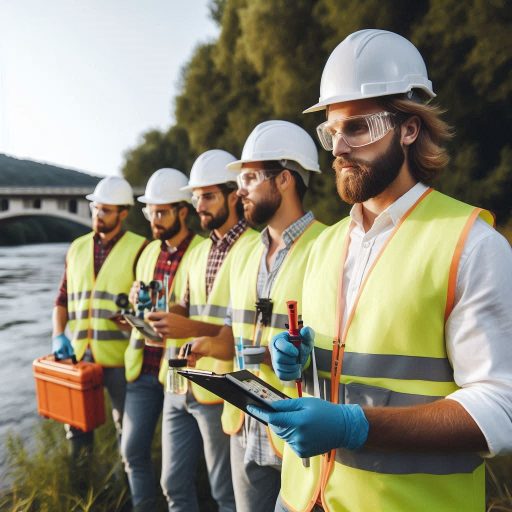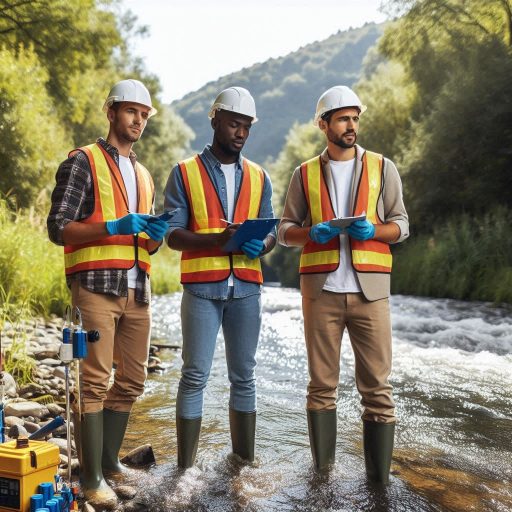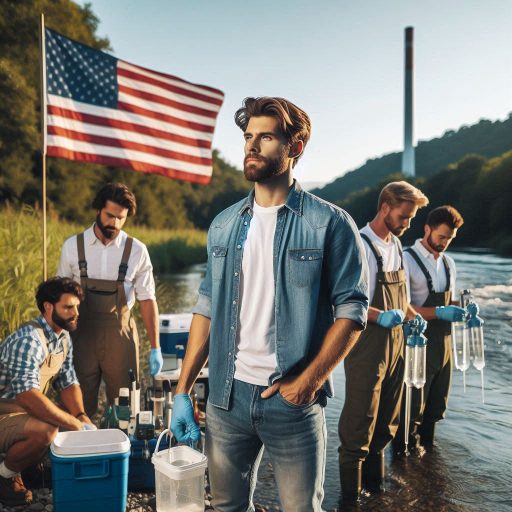Introduction
Hydrologists play a key role in sustainable development by managing and preserving water resources.
They ensure water availability for future generations while protecting ecosystems.
Sustainable water management is crucial in addressing global challenges like climate change, population growth, and pollution.
Hydrologists help design water management systems that balance human needs with environmental protection.
They assess water supplies, forecast availability, and develop strategies to minimize overuse and contamination.
This work is vital as water resources become increasingly stressed due to changing climate patterns.
Sustainable water management focuses on using water efficiently while maintaining ecosystem health.
Hydrologists develop strategies to reduce water waste, prevent contamination, and restore damaged water systems.
Their work supports agriculture, industry, and urban areas while protecting natural ecosystems.
In today’s world, water scarcity and pollution threaten global sustainability.
Hydrologists provide essential insights that help policymakers create effective conservation policies.
They also work with communities and organizations to implement sustainable practices that ensure long-term water security.
Hydrologists are crucial to sustainable development.
Their expertise in managing water resources supports environmental health and addresses the growing need for responsible water use.
Understanding Water Resources
Role of Hydrologists in Studying and Analyzing Water Resources
Hydrologists play a critical role in sustainable development by studying and analyzing water resources.
They focus on understanding water‘s movement, distribution, and quality across different ecosystems.
Hydrologists examine the water cycle to determine how much water is available in a region.
This knowledge is essential for developing long-term strategies to meet human and environmental needs.
Hydrologists use various tools and technologies to monitor water levels, flow rates, and water quality.
Their analyses help predict water shortages, floods, and contamination risks.
By collecting and interpreting data, hydrologists provide valuable insights that guide decision-makers in managing water resources responsibly.
Assessing Water Availability and Quality for Sustainable Development
Water availability and quality are crucial for sustainable development.
Hydrologists assess these factors to ensure communities have access to safe and sufficient water supplies.
They evaluate the quantity of water in rivers, lakes, and groundwater sources.
Additionally, they measure the quality of water by testing for pollutants and contaminants.
When assessing water availability, hydrologists consider factors like rainfall patterns, snowmelt, and groundwater recharge rates.
This information allows them to estimate how much water can be used without depleting natural resources.
Hydrologists‘ findings are used to create sustainable water use policies that balance human consumption with environmental preservation.
Water quality is another key area where hydrologists contribute to sustainability.
They identify sources of pollution, such as industrial waste or agricultural runoff, and recommend solutions to improve water quality.
These solutions may involve regulating pollutants or designing better wastewater treatment systems.
By protecting water quality, hydrologists help prevent health risks and ensure that water remains a viable resource for future generations.
Supporting Infrastructure Development for Water Management
Hydrologists contribute to the planning and construction of water infrastructure.
Their expertise is essential in designing dams, reservoirs, irrigation systems, and stormwater management systems.
By studying local water conditions, hydrologists provide guidance on where to build infrastructure that optimizes water use and storage.
Sustainable infrastructure development requires careful consideration of environmental impacts.
Hydrologists analyze how water projects will affect ecosystems and biodiversity.
Their assessments help mitigate negative consequences, such as habitat disruption or changes to natural water flow.
By balancing infrastructure needs with environmental protection, hydrologists ensure sustainable water management practices.
Climate change presents new challenges for water resources, and hydrologists play a vital role in addressing these issues.
Rising temperatures and changing precipitation patterns affect water availability and quality.
Hydrologists study these changes to predict how climate change will impact water supplies.
In areas facing water scarcity, hydrologists develop strategies to conserve and manage water efficiently.
They promote water-saving technologies, such as efficient irrigation systems and rainwater harvesting.
Their work helps communities adapt to changing conditions and maintain sustainable water supplies.
Hydrologists are essential contributors to sustainable development, playing a vital role in studying water resources, assessing availability and quality, and guiding responsible water use.
Their expertise supports the development of sustainable infrastructure and helps address climate-related water challenges.
Through their efforts, hydrologists ensure that water remains a viable resource for both current and future generations.
Implementing Water Conservation Strategies
Developing Plans and Strategies to Conserve Water Resources
Hydrologists play a crucial role in sustainable development by developing effective water conservation plans.
They assess the availability and distribution of water resources.
Through detailed analysis, hydrologists identify areas at risk of water shortages or overuse.
This data allows them to design targeted strategies that promote sustainable water management.
One of their key tasks is to create models that predict future water needs.
These models account for population growth, climate change, and other factors affecting water supply.
By planning for the future, hydrologists help ensure that communities have access to clean water for years to come.
Their work is essential in preventing water scarcity.
Hydrologists also collaborate with policymakers and governments.
They provide scientific insights that inform decisions on water resource management.
Whether it‘s advising on dam construction or irrigation systems, hydrologists ensure water is used efficiently and sustainably.
They offer solutions that balance environmental preservation with human needs.
Promoting Efficient Water Use and Conservation Practices in Communities
Hydrologists are key advocates of efficient water use and conservation practices within communities.
They educate the public on the importance of reducing water waste.
By conducting awareness campaigns and workshops, they help individuals and businesses understand how to conserve water.
This education is vital, especially in regions facing water shortages.
Moreover, hydrologists work closely with local governments to implement water-saving programs.
They help establish guidelines for water usage in households, agriculture, and industries.
These programs can include the installation of water-efficient technologies such as low-flow faucets and smart irrigation systems.
Hydrologists’ expertise ensures these initiatives are both effective and sustainable.
In agriculture, hydrologists develop techniques that use water more efficiently.
They support the implementation of drip irrigation systems, which minimize water waste.
These systems deliver water directly to the roots of crops, reducing evaporation and runoff.
By promoting these practices, hydrologists help conserve water while maintaining agricultural productivity.
Hydrologists also contribute to urban water conservation.
They assist in the design of green infrastructure, such as rain gardens and permeable pavements.
These systems capture and reuse stormwater, reducing the demand for fresh water.
Hydrologists’ innovative solutions ensure that communities can thrive without depleting water resources.
Hydrologists contribute significantly to sustainable development through their work in water conservation and management.
By developing strategic plans, they ensure the sustainable use of water resources for future generations.
Their scientific insights and data-driven approaches help governments and policymakers make informed decisions about water use.
Hydrologists also promote efficient water use and conservation within communities.
Through education and technology, they encourage responsible water consumption.
Their work is crucial in addressing water scarcity, especially in areas prone to shortages.
Hydrologists’ efforts play a vital role in balancing the needs of human populations with environmental sustainability.
Read: Day in the Life: An Environmental Scientist‘s Typical Day
Managing Watersheds
Working to Protect and Restore Watersheds for Long-Term Sustainability
Hydrologists play a crucial role in protecting and restoring watersheds to ensure long-term sustainability.
Watersheds are essential as they collect and supply fresh water to ecosystems and human populations.
Hydrologists monitor water quality, assess potential threats, and develop strategies to restore damaged or degraded watersheds.
One key responsibility for hydrologists is identifying factors that disrupt watershed health.
These include pollution, deforestation, and unsustainable agricultural practices.
By studying these factors, hydrologists can propose restoration efforts that revitalize water quality and promote ecosystem balance.
Restoration projects often involve implementing erosion control techniques and replanting native vegetation.
These efforts help to stabilize soils, reduce runoff, and improve water infiltration.
Hydrologists ensure that these projects are scientifically sound, ensuring that restored watersheds continue to provide clean water for generations.
Hydrologists also focus on preserving natural water cycles within watersheds.
They emphasize the importance of allowing groundwater recharge and natural stream flows to continue uninterrupted.
This approach not only sustains freshwater sources but also ensures that ecosystems remain resilient to environmental changes.
Collaborating with Stakeholders to Manage Watersheds Effectively
Effective watershed management requires collaboration with multiple stakeholders, including governments, communities, and industries.
Hydrologists work with these groups to balance human needs with environmental protection.
Their expertise ensures that watershed management plans prioritize sustainability.
Hydrologists engage with local communities to raise awareness about the importance of watershed conservation.
They organize workshops and educational programs to teach people about the value of protecting water sources.
By involving the public, hydrologists encourage community participation in maintaining clean and healthy watersheds.
Working with governments is another critical aspect of watershed management.
Hydrologists collaborate with policymakers to establish regulations that protect water resources.
These regulations may include restrictions on harmful industrial practices or incentives for adopting sustainable land use practices.
Hydrologists provide scientific data to support these policies, ensuring that they are based on sound environmental principles.
Industries that rely on water, such as agriculture and manufacturing, are key stakeholders in watershed management.
Hydrologists help these industries implement water-saving practices and minimize pollution.
By promoting efficient water use and pollution control measures, hydrologists ensure that industries can thrive without harming natural water systems.
Collaborative watershed management is also vital for addressing the impacts of climate change.
Hydrologists work with stakeholders to develop adaptive strategies that protect watersheds from extreme weather events.
These strategies may involve constructing flood control measures or adjusting water management practices to accommodate changing rainfall patterns.
Hydrologists are essential contributors to sustainable development, particularly in the protection and restoration of watersheds.
They work tirelessly to identify threats, develop restoration strategies, and promote sustainable water use.
Collaboration with stakeholders ensures that watershed management balances environmental preservation with human needs.
Through their efforts, hydrologists help secure long-term water availability, protect ecosystems, and contribute to the overall health of the planet.
Read: The Impact of Technology on the Chemist Profession in the US

Addressing Water Pollution
Identifying Sources of Water Pollution and Its Impact on Ecosystems
Hydrologists work to identify the sources of water pollution, which are often diverse and widespread.
Pollution comes from various origins, including agricultural runoff, industrial waste, and urban stormwater.
Hydrologists use advanced technology and fieldwork to trace these contaminants to their sources.
They analyze water samples from rivers, lakes, groundwater, and coastal areas to determine the presence of harmful chemicals, sediments, or biological contaminants.
Once they identify the pollution sources, hydrologists study the impact on ecosystems.
Water pollution can disrupt ecosystems by harming aquatic plants, animals, and microorganisms.
It may lead to the depletion of oxygen levels in water bodies, creating dead zones where life struggles to survive.
Hydrologists assess how pollutants affect water quality, biodiversity, and the balance of local habitats.
This information is crucial for developing strategies that promote healthier ecosystems and protect biodiversity.
Developing Solutions to Reduce Water Pollution for Sustainable Development
After identifying pollution sources, hydrologists collaborate with policymakers, engineers, and environmentalists to develop solutions that reduce water pollution.
These solutions range from creating better waste treatment systems to improving land-use planning to prevent future contamination.
Hydrologists often recommend the use of natural water filtration systems, such as wetlands, which filter pollutants before they reach rivers and lakes.
A key aspect of sustainable development is ensuring water resources are protected for future generations.
Hydrologists design water conservation programs that focus on reducing pollution and managing water use efficiently.
For example, they may work on projects to restore natural water flow in rivers, which helps flush out contaminants and maintain clean water systems.
Advancing Sustainable Agricultural Practices
Agriculture is a significant source of water pollution due to runoff containing pesticides, fertilizers, and animal waste.
Hydrologists contribute to developing sustainable agricultural practices that minimize these impacts.
They promote the use of best management practices (BMPs), such as planting cover crops, reducing chemical inputs, and managing irrigation systems more efficiently.
These practices reduce runoff, protect water sources, and support sustainable food production.
Industries often discharge pollutants into water bodies through improper waste management.
Hydrologists work with industries to develop cleaner processes, such as treating wastewater before release.
They also encourage the recycling of water within industrial processes to minimize water consumption and reduce contamination risks.
These efforts support industries in meeting regulatory standards while contributing to overall sustainability.
Hydrologists contribute to sustainable development by identifying water pollution sources and developing solutions to reduce environmental impact.
Their expertise helps balance human needs and environmental protection, ensuring that water resources remain clean and available for future generations.
By fostering sustainable practices in agriculture, industry, and water management, hydrologists play a crucial role in preserving ecosystems and promoting long-term sustainability.
Read: US Chemistry Conferences and Symposiums to Attend in 2024
Monitoring and Forecasting Water Availability
Utilizing Tools and Technology to Monitor Water Levels and Availability
Hydrologists play a crucial role in sustainable development by using advanced tools and technology.
They monitor water levels, quality, and availability in various ecosystems.
These technologies provide accurate, real-time data on water resources.
This information helps decision-makers implement sustainable practices.
Remote sensing and satellite imagery allow hydrologists to track water bodies and predict future trends.
These tools help monitor the effects of climate change on water systems.
Groundwater monitoring systems also track underground water reserves, ensuring their sustainable use.
Hydrologists use data collection devices like flow meters and rain gauges.
These instruments monitor stream flows, precipitation, and water table levels.
By analyzing this data, hydrologists can predict potential water shortages.
This proactive approach helps communities manage water resources more efficiently.
Providing Early Warning Systems for Potential Water Shortages
One of the most important contributions hydrologists make is providing early warning systems for water shortages.
Hydrologists assess water demand and supply to forecast shortages before they occur.
These systems help governments and industries prepare for and prevent water crises.
Hydrologists use predictive models based on climate data, soil moisture, and precipitation levels.
These models identify regions likely to experience water shortages.
By predicting water availability, hydrologists enable more effective water management strategies.
Early warnings give communities time to implement water-saving measures.
Governments rely on hydrologists to guide policy decisions around water allocation.
In agriculture, for example, early warning systems help farmers plan for droughts.
Hydrologists provide valuable information that supports sustainable water use in industries, cities, and rural areas.
Early Warning Systems for Potential Floods
Flood prediction and prevention are also key areas where hydrologists contribute.
Using hydrological models, hydrologists predict the likelihood of flooding in specific regions.
These early warnings allow authorities to take preventive action, reducing damage and loss of life.
Hydrologists monitor river levels and rainfall patterns using remote sensors and data collection systems.
When water levels rise, hydrologists issue alerts to local authorities.
This early warning system gives residents time to evacuate or take flood precautions.
It also helps emergency services prepare for potential flood disasters.
Hydrologists work closely with urban planners to manage flood risks in cities.
By analyzing terrain and water flow patterns, they help design infrastructure that minimizes flood impact.
Sustainable flood management strategies protect both human populations and natural ecosystems.
Hydrologists also advocate for sustainable water use in both urban and rural settings.
They advise governments and organizations on efficient water management practices.
These recommendations promote the conservation of freshwater resources and reduce water waste.
Hydrologists assess the sustainability of water extraction practices in industries such as mining and agriculture.
By ensuring that water is extracted at sustainable rates, hydrologists help prevent depletion of critical water sources.
Their expertise ensures that future generations have access to safe and clean water.
In fact, hydrologists are essential to sustainable development.
They utilize advanced tools to monitor water levels and provide early warnings for potential shortages and floods.
Their contributions help protect water resources and promote sustainability in water management.
Read: Essential Skills and Tools for Modern Chemists in America
Promoting Sustainable Water Use
Educating Communities on Sustainable Water Use
Hydrologists work directly with communities to raise awareness about the importance of sustainable water use.
They offer insights into how local water systems function and explain the impact of human activities on water resources.
Education is a powerful tool for empowering individuals to take responsibility for water conservation.
Through workshops, presentations, and outreach programs, hydrologists break down complex concepts about water systems.
They educate the public about the water cycle, groundwater recharge, and the effects of over-extraction.
By translating scientific data into accessible information, hydrologists help communities understand their role in sustainable water management.
In regions prone to drought or water scarcity, hydrologists collaborate with local governments and organizations to promote efficient water use.
They demonstrate simple practices like reducing water waste and utilizing rainwater harvesting.
These efforts can significantly extend the availability of fresh water, especially in vulnerable regions.
Hydrologists also provide guidance to farmers and industries on minimizing water usage.
They introduce advanced irrigation techniques and water-saving technologies that maintain productivity while reducing environmental impact.
These practices ensure that vital water resources are conserved for future generations.
Encouraging Behavior Change to Promote Water Conservation
Encouraging behavior change is another key responsibility for hydrologists.
Raising awareness alone is not enough; people need practical, actionable steps to adopt sustainable habits.
Hydrologists promote small changes in daily routines that can collectively make a big difference in water conservation.
They encourage individuals to monitor and reduce their water usage at home.
Simple actions such as fixing leaks, using water-efficient appliances, and shortening showers can drastically cut down water waste.
Hydrologists emphasize that individual efforts, when scaled across communities, contribute to significant reductions in water demand.
In addition to households, hydrologists target agricultural and industrial sectors.
By recommending sustainable practices like drip irrigation and precision agriculture, they help farmers conserve water while maintaining crop yields.
In industries, hydrologists guide companies in optimizing water use and reusing water in production processes.
Hydrologists also collaborate with policymakers to enforce regulations that promote water sustainability.
They advocate for water pricing models that reflect the true value of water resources.
These policies incentivize conservation by encouraging individuals and industries to prioritize water-saving measures.
Behavior change campaigns led by hydrologists often focus on long-term thinking.
They inspire communities to view water as a shared resource that must be protected for future generations.
Hydrologists highlight the connection between sustainable water practices and the broader goals of sustainable development.
Hydrologists are vital in educating communities about sustainable water use and promoting behavior change for water conservation.
By simplifying complex concepts and offering practical solutions, they empower individuals and industries to adopt responsible water practices.
Their work not only ensures the preservation of essential water resources but also supports global efforts toward sustainable development.
Through education, collaboration, and advocacy, hydrologists contribute to building a more sustainable future, one where water is managed responsibly and equitably for all.
Transform Your Career Today
Unlock a personalized career strategy that drives real results. Get tailored advice and a roadmap designed just for you.
Start NowYou Might Also Like: Public Health vs. Epidemiology: Career Choice Guide
Conclusion
Hydrologists play a crucial role in promoting sustainable development.
They help manage water resources, ensuring long-term availability for all.
Their expertise aids in addressing global water challenges, such as scarcity and pollution.
Hydrologists study water cycles and monitor water quality, essential for environmental conservation.
By analyzing water flow and distribution, they guide sustainable urban planning and agricultural practices.
They also contribute to mitigating the impacts of climate change by predicting floods and droughts, protecting vulnerable communities.
Their work supports infrastructure development that balances economic growth with environmental preservation.
For example, hydrologists design systems that efficiently manage stormwater and reduce contamination of natural water sources.
They ensure that industries use water responsibly, minimizing waste and preventing pollution.
The contributions of hydrologists are essential for a sustainable future.
By helping manage water resources, they protect ecosystems and promote equitable access to clean water.
Their insights shape policies that prioritize environmental stewardship and support human development.
Hydrologists’ efforts are critical to achieving sustainability goals on a global scale.
As water becomes an increasingly precious resource, their role in ensuring its availability is more important than ever.
Their work contributes to building a resilient future where people and nature thrive in harmony.




